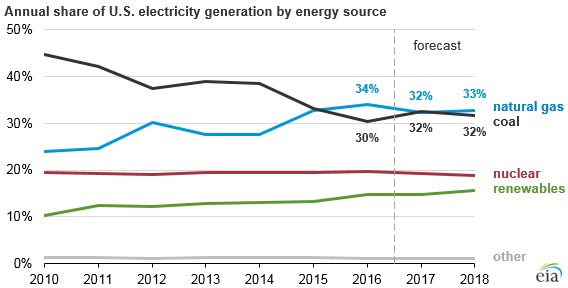Facing questions on Capitol Hill over his proposal to subsidize coal and nuclear power plants, Energy Secretary Rick Perry said the notion of a free market in energy generation is a “fallacy.”
The hearing before the House Energy Subcommittee contained some noteworthy moments, including when Perry was unable to answer a basic question about his controversial proposal and implied the regulators who are considering it do not take a long-term view of energy markets.
The proposal in question asks the Federal Energy Regulatory Commission to consider, on an expedited timetable, a rule to compensate coal-fired plants and nuclear power stations for the reliability they bring to the nation’s electricity supply. Perry’s proposal has gotten push back from power industry groups, environmentalists and even one of the FERC commissioners.
“We will not destroy the marketplace,” FERC Commissioner Robert Powelson told an audience last week when asked about the proposal.
The Energy Department’s request that FERC make a final decision within 60 days has drawn criticism in particular, given that the Energy Department and the North American Reliability Corporation have both determined the nation’s power system remains reliable. Some contend the department is rushing the process to rescue distressed coal and nuclear plants.
The share of the nation’s power generated from coal and nuclear energy has slipped due to cheap, abundant natural gas and the rapid growth of solar and wind farms. President Donald Trump has vowed to revive the coal industry.
Perry faced an early grilling from Rep. Frank Pallone in his opening statement. The New Jersey Democrat accused the Trump administration of hypocrisy, noting Environmental Protection Agency Administrator Scott Pruitt earlier this week criticized the Obama administration for favoring renewable energy in its bid to regulate carbon emissions from power plants.
“It’s an ironic proposal considering that EPA Administrator Pruitt stated as part of his announcement in rolling back the Clean Power Plan — and again I’m quoting — that ‘regulatory power should not be used by any regulatory body to pick winners and losers,'” Pallone said.
“But Mr. Secretary, that’s exactly what you’re doing here. You’re distorting the market, damaging the environment and delivering preferential treatment to favored industries, and at the end of the day, killing off competitive electricity markets just to save generation assets that are no longer economical,” he said.

Pallone notified Perry that his office was requesting a detailed accounting of the process the Department of Energy followed to develop the proposal, including records of staff meetings and taxpayer funds spent on the matter.
Rep. Fred Upton, R-MI and chairman of the subcommittee, asked Perry why the Energy Department ordered FERC to consider its proposal on an expedited basis, and whether there was a level of urgency that was not being addressed elsewhere.
“The base reason that we asked for this, for FERC to take a look at this and to act, is that for years this has been kicked down the road, if you will,” Perry responded.
There was an awkward moment when Rep. Upton asked Perry about the timetable the Energy Department gave FERC. Perry said he did not know, turned to his aides and shrugged his shoulders. He turned back to say, “Sixty days is the, I think, the … ” before making a hand gesture indicating length.
Perry said that in a “mythical world” unfettered competition would create a reliable and resilient power system, but in the real world, every state regulates energy markets to some degree.
“I think the idea that there is a free market in electrical generation, it’s not a bit of a fallacy, it is a fallacy,” he said.
“We subsidize a lot of different energy sources. We subsidize wind energy. We subsidize ethanol. We subsidize solar. We subsidize oil and gas … and so the question is how do you make it as fair as you can?” he added in a follow-up answer.
Asked by Rep. Bobby Rush about FERC and NERC’s assessments that the U.S. power system remains reliable, Perry suggested FERC members take a short-term view of the market, and he was trying to make a longer-term assessment of future needs.
“I respect the FERC members’ views. I think their picture is one that is a snap shot in time. There’s blue skies. The sun’s shining. The wind’s blowing. The pipelines are carrying gas,” he said.
FERC is an independent federal agency that regulates electricity and natural gas transmission and wholesale retail across state lines.
